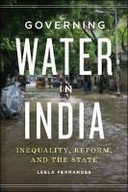Explore

Intensifying droughts and competing pressures on water resources foreground water scarcity as an urgent concern of the global climate change crisis. In India, individual, industrial, and agricultural water demands exacerbate inequities of access and expose the failures of state governance to regulate use. State policies and institutions influenced by global models of reform produce and magnify socio-economic injustice in this "water bureaucracy." Drawing on historical records, an analysis of post-liberalization developments, and fieldwork in the city of Chennai, Leela Fernandes traces the configuration of colonial historical legacies, developmental-state policies, and economic reforms that strain water resources and intensify inequality. While reforms of water governance promote privatization and decentralization, they strengthen the state centralized control over water through city-based development models. Understanding the political economy of water thus illuminates the consequent failures of the state within countries of the Global South.
This book is included in DOAB.
Why read this book? Have your say.
You must be logged in to comment.
Rights Information
Are you the author or publisher of this work? If so, you can claim it as yours by registering as an Unglue.it rights holder.Downloads
This work has been downloaded 32 times via unglue.it ebook links.
- 32 - pdf (CC BY-NC-ND) at Unglue.it.
Keywords
- Asian history
- Conservation of the environment
- Environmental science, engineering & technology
- History
- Humanities
- Politics & government
- Politics and government
- Regional & national history
- Sanitary & municipal engineering
- Society & Social Sciences
- Technology, engineering, agriculture
- The environment
- Water supply & treatment
- Water supply and treatment
Links
DOI: 10.6069/9780295750446Editions

